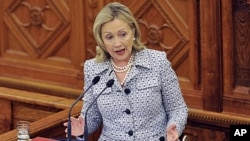Secretary of State Hillary Clinton says the United States will pursue a policy of "limited contacts" with Egypt's Muslim Brotherhood movement, considered that country's strongest political party. Clinton, speaking in Budapest, said U.S. diplomats will press the Islamic movement on non-violence and respect for minority and women's rights.
The United States has had political contacts in the past with Muslim Brotherhood members of the Egyptian parliament, who were elected as nominal independents.
|
VOA's David Gollust discusses US Secretary of State Hillary Clinton's announcement:
|
Now, with the old parliament dissolved and critical elections looming in September, U.S. officials will be able to deal directly with leaders of the influential Egyptian party.
Clinton confirmed the policy shift at a news conference Thursday with Hungarian Prime Minister Viktor Orban in Budapest. She said that given the "changing political landscape" in Egypt, it is in the interests of the United States to engage with all parties that are committed to non-violence and intend to compete for the Egyptian parliament and presidency.
Clinton said U.S. officials welcome dialogue with Muslim Brotherhood members who wish to engage, and that they will hear a message of inclusion.
"In any of those contacts, prior or future, we will continue to emphasize the importance of and support for democratic principles," Clinton noted. "And especially a commitment to non-violence, respect for minority rights, and the full inclusion of women in any democracy. You cannot leave out half the population and claim that you are committed to democracy."
A spokesman for the Muslim Brotherhood said the group would welcome any formal contacts with the United States as a way to clarify its program, but that it would not accept interference in Egyptian affairs.
Though officially a banned organization during the years of rule of ousted former Egyptian President Hosni Mubarak, Brotherhood members ran for parliament as independents and become the largest opposition bloc in the former parliament, dissolved in February by the country's interim military leadership.
The revised U.S. policy will allow a direct dialogue to continue with the party, which is fielding candidates for the new parliament, but not the presidency.
Though the Muslim Brotherhood has renounced violence as a means for change, the Palestinian Hamas movement - inspired by the Egyptian party - has not and is listed by the State Department as a terrorist organization.
The U.S. contacts with the Islamic party could be unsettling to Israel and Arab states seen as threatened by Islamic militancy.
But Arab politics expert David Schenker of the Washington Institute for Near East Policy says having the dialogue will allow the United States to make clear, first hand, the concerns it has about the party's political vision. He said the dialogue need not be a concern for Egypt's neighbors.
"I think we should be making clear to anybody who will listen that our discussions with the brotherhood in no way suggest our endorsement," Schenker said. "We have a stake in how things develop in Egypt, about who wins. And I think we can make it clear that even as we are discussing, having talks with the group and getting insight into this group that we would prefer that liberals are voted into office."
Schenker said the tight election schedule, with voting set in less than three months, gives the better organized Muslim Brotherhood an advantage over newly-formed liberal and moderate political parties, especially outside the major Egyptian cites of Cairo and Alexandria.
Liberal and secular groups have pressed for an election delay until after a new Egyptian constitution has been drafted. Tunisia, facing similar circumstances, recently pushed back its planned elections from July 24th to October 23rd.









